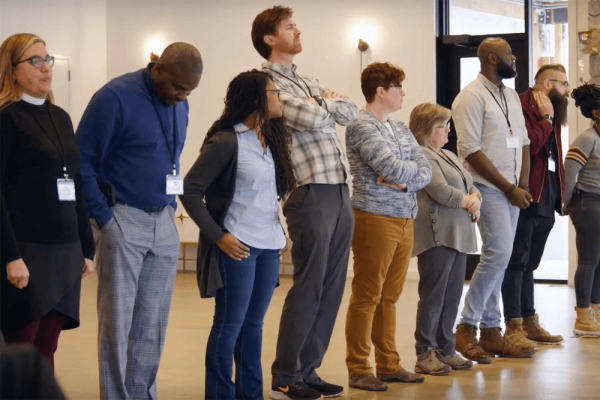In August 2022, Mennonite minister Rev. Michael Gulker brought together 12 pastors of different denominations from Grand Rapids, Mich., with a unique proposal — to spend a year together exploring their differences with the hope of finding a way beyond them. In the face of increasing polarization within the U.S. and within Christian communities, Gulker, who lived in Grand Rapids, had spent more than a decade leading the Colossian Forum, a nonprofit dedicated to creating workshops and curricula that might help Christians learn how to talk about their differences in ways that actually deepened their love of God and one another.
In his program “Sowing Seeds of Hope,” Gulker imagined a bolder effort than the Forum’s usual initiatives: an entire year of retreats and workshops amongst pastors of vastly different communities. The Michigan pastors held a wide range of views. Some welcomed gay marriage, some did not; some welcomed women in leadership, some did not. They also arrived with a variety of fundamental concerns, from curbing gun violence to dismantling racism in law enforcement to securing LGBTQ+ justice and reproductive rights. Gulker asked these participants whether their divisions and fragmentations might offer an opportunity, rather than an obstacle.
“Vulnerability is not a weakness,” he told them. “Vulnerability is not a choice. Vulnerability is the underlying, ever-present and abiding undercurrent of our natural state.” So rather than running from it, he asked, what if we spend a year “inhabit[ing] our vulnerability?”
The cohort of 12, seven men and five women, not only decided to be a part of what seemed likely to be a personally challenging experiment; they agreed to be filmed doing it.
After finishing Won’t You Be My Neighbor?, the tender and celebrated documentary about the life of children’s television icon Fred “Mister” Rogers, filmmakers Nicholas Ma and Morgan Neville had been looking for a new story. “Coming out of Won’t You Be My Neighbor?,” says Ma in a phone interview, “the question everyone asked was, ‘Where are the Fred Rogers of today?’” Learning about Gulker’s work from a story in the Wall Street Journal, they thought he might be a good candidate. Ma jokes, “Perhaps part of me was also thinking, ‘People seem to like one midwestern minister talking for an hour and a half. What about a dozen?!’”
The film which they’ve produced, Leap of Faith (which began a limited release in theaters this month), is an extraordinary and surprising journey into trust and friendship. Prior to beginning their year together, Ma confides, he, Neville, and Gulker agreed they didn’t want to make a film about sexuality. “It felt cliché,” said Ma. The pastors didn’t want to spend a year on that topic, either. They had so many other, more pressing concerns. Gulker hoped white supremacy might provide a focus.
But session after session, homosexuality was the topic that kept coming up. An early workshop in which the pastors were asked to stand on opposite sides of the room depending on their position on different issues like reproductive rights or women in ministry left a number of pastors shaken, particularly by their differences on gay marriage. Methodist pastor Rev. Joan VanDessel, a married lesbian woman, found herself unexpectedly emotional to see the opposition to gay marriage embodied so clearly, while others felt deeply uncomfortable with how their position had hurt others in the room.
As the year went on, the group struggled with how to contend with their divided reality. “Why can’t we be who we are and that be okay to the next person?” one pastor wondered. And yet rather than letting that separation rigidify into some kind of “us” and “them” divide, the dissonance tenderized their hearts to one another, such that by the end of the year, the grief they had shared around the topic of homosexuality, the gaps that they couldn’t figure out how to cross, had actually bonded them more deeply together.
At various moments in the film, Ma and Neville stop to give each pastor the chance to share directly with the audience about what it’s like to be a pastor and how they’re feeling about the vulnerability being asked of them. The group is surprisingly candid about the realities of their lives, the fears and insecurities they face as Christian pastors. “We often want to flatten people,” Ma notes. “And I think right now Christianity gets very flattened.” In working with the pastors, he explains, he and Neville instead took the approach of saying, “Show me how complicated you are. Show me the complexities of what you contend with.”
The result is a revelatory portrait of what it’s like to be a pastor today. And one of the most powerful stories ends up being that of Gulker, who finds himself confronted with the difference between his publicly expressed uncertainty about gay marriage as a Christian minister and his private experience of having two LGBTQ+ children. As the year goes on, he begins to realize that his efforts to help Christian communities deal with polarization have actually come from a much more personal agenda. “My work has been this frenetic attempt to create a space that was not going to be painful for them [his children], so I don’t have to feel their pain.”
Perhaps the most unexpected element of Leap of Faith, though, is the experience of watching it. Over the last decade, our media has grown oversaturated with stories about growing divisions within the United States. It’s covered so relentlessly, in fact, it’s hard for such stories to find an audience.
And yet, there’s a patience to Ma and Neville’s filmmaking, an insistence on dwelling in the moment of it all that invites us, as Gulker does the pastors, to simply settle in and be open to whatever the Spirit might want to say to us through the pastors’ experiences.
Ma’s father, the renowned cellist Yo-Yo Ma, points to the underlying sense of quiet to the film
as an important part of that invitation. “You know how uncomfortable our society is with silence — at weddings, the music is too loud. At restaurants there’s a lot of music. If you go to the supermarket there’s muzak. But in silence, that’s when your antenna have to go broader,” he says. Lacking the kind of explosive arguments or other dramatic moments that one might find in other films on this topic actually draws us in more deeply.
The film ends without the kind of resolution one might expect — a point the pastors themselves note with some frustration. Given the important social and religious issues their congregations face, many hoped that the year might provide some shared momentum or action.
And yet reaching some sense of agreement ends up seeming less substantial than what the group has actually received. In their final session together, each pastor is asked to introduce one of the others. Having spent the full year together, they all know each other so well now, and care for each other so deeply (no matter their different positions), that many of them are reduced to tears by what their colleagues share. To be truly seen, known, and accepted as they are, is a source of tremendous grace and relief.
“I used to work really hard to appease the fear,” Gulker shares with the group. “Now what I want to say is, ‘Take courage. You be who you are, I’ll be who I am, and we’ll find a way through together.’”
Got something to say about what you're reading? We value your feedback!







